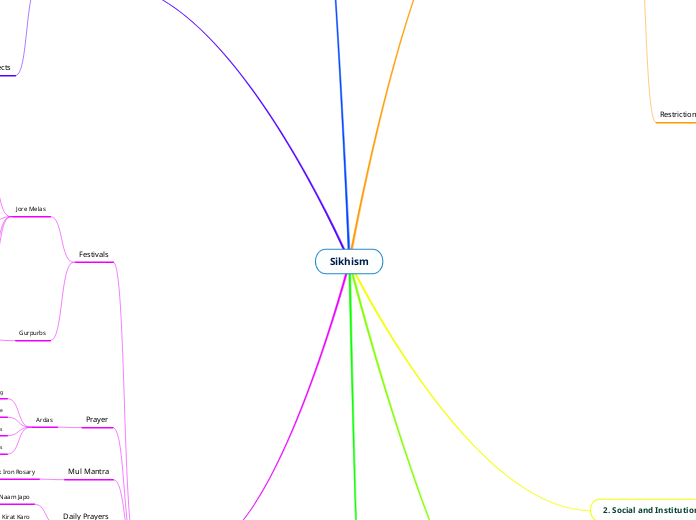によって Nick Dimech 3年前.
231
Sikhism
Sikhism emphasizes good deeds over rituals and highlights significant life events such as marriages and funerals. Sikh marriages, known as Anand Karaj, typically occur at the bride'

によって Nick Dimech 3年前.
231

もっと見る
Hymns
Amrit
Stirred w/ ceremonial Kirpan
Reads from: Guru Granth Sahib
Prayers
Celebrated w/ Karah Parshad
Only serves vegetarian meals
Blessing for the 10 Gurus
Recitation of key life events
Recites the gods name
A call for mental well-being
Celebrates the Gurus
Birthdays
Guru Gobind Singh (January)
Guru Nanak (November/December)
Nanak Jayanti
Procession in: Amritsar
Martyrdom
Guru Arjan (June)
Guru Tegh Bahadur (November/December)
Holiday
Diwali
Imprisonment and release of Guru Hargobind (Sixth Guru)
Hola Mohalla
ONLY occurs in Punjab (Spring event)
Martial arts
Baisakhi
April 13 or 14 annually
Sikhism New Year
Origins of the Khalsa are told
Power of God
Chakkar (Circle)
Kirpan (two swords)
Double-edged sword
Introduced by: Guru Hargobind (sixth guru)
Guru
Focused breathing
Wahe
Guru Gobind Singh (1675-1708)
Created the Khalsa
Guru Tegh Bahadur (1664-1675)
Guru Har Krishan (1661-1664)
Guru Har Rai (1644-1661)
Guru Hargobind (1606-1644)
Guru Arjan Dev (1581-1606)
Guru Ram Das (1574-1581)
Guru Amar Das (1552-1574)
Guru Angad Dev (1539-1552)
Formalized the Gurmukhi Alphabet
Guru Nanak (1469-1539)
Founder of Sikhism
Kesh (Uncut Hair)
Kangha (Wooden Comb)
Kachera (Cotton Underpants)
Kirpan (Ceremonial Dagger)
Kara (Iron Bracelet)
Worship of the dead
Superstition
Blind fasting
Pilgrimage of holy places/sites
Idol worship
Cutting of hair
Always wear a turban (male), or chunni/dupatta (female)
Gambling
Personally motivated discrimination
Status discrimination
Caste discrimination
Sexism
Racism
Taking intoxicants
Alcohol
Drugs
Mukti
Waheguru
Monotheistic
Kaam (Lust)
Ahankar (Ego/Pride)
Lobh (Greed)
Krodh (Angry)
Moh (Attachment)
Santokh (Contentment)
Sat (Truth)
Daya (Compassion)
Nimrata (Humility)
Pyar (Love)
Dharam Khand (Realm of Moral Duty)
Giyan Khand (Realm of Spiritual Knowledge)
Saram Khand (Realm of Spiritual Efforts)
Karam Khand (Realm of Grace)
Sach Khand (Realm of Truth)
Vand Chhakna/Dhan (Give)
Nam Japna/Man (Pray)
Kirt Karna/Tan (Work)